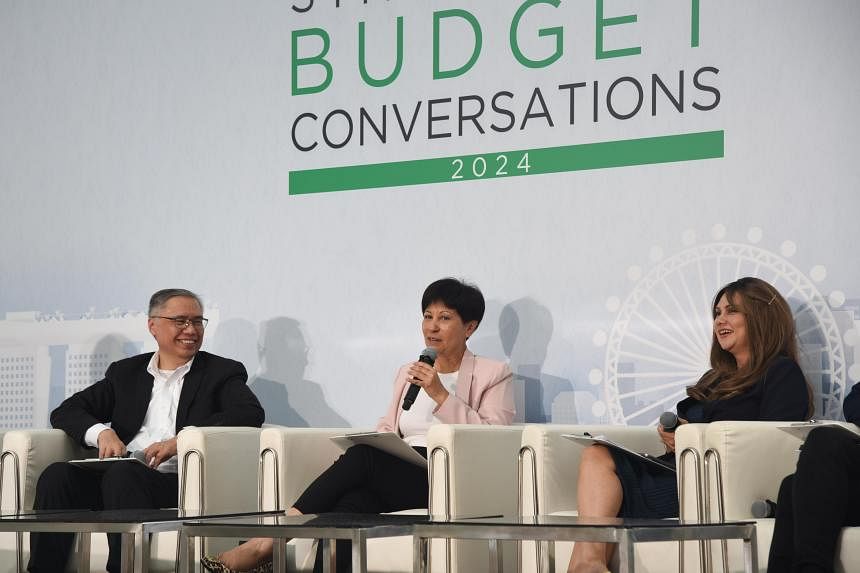SINGAPORE – Incentives to upskill workers will give them a career boost, but there is still uncertainty over whether some of these initiatives will truly meet firms’ needs.
The measures are part of Budget 2024, which is not an “election budget” but instead pushes ahead with the Forward Singapore plan that was unveiled in 2023 and lays out the moves the Republic will make in the coming years to stay cohesive at a time of change.
These were some of the points raised at a MoneyFM 89.3 panel discussion held at the UOB Plaza Atrium in Raffles Place on Feb 21.
Minister in the Prime Minister’s Office and Second Minister for Finance Indranee Rajah said that the phrase “election budget” conveys a sense of trying to please the crowd.
“It kind of implies a yo-yo effect where you give a lot one year, and then you don’t give in others. But that’s not how we’ve approached this year’s Budget... Budget 2024 gives effect to the (Forward SG) plan in a very deliberate and measured way,” said Ms Indranee, who is also Second Minister for National Development.
She was responding to a question on whether Budget 2024 paves the way for Singapore’s next general election, which is due by November 2025.
“When you’re planning for a country, and you’re planning for the future, you can’t do it in sprints. To take the country forward, you need to be able to run a marathon at a sustained, even pace to get you through the course. And this is part one of a whole range of plans that we have to make sure that we have a better and brighter future,” said Ms Indranee, who was speaking at the discussion with four other panellists.
Asked how Singapore will continue to afford Budgets like this year’s $131.4 billion proposal, Ms Indranee noted that the Government has used various strategies such as tapping the investment returns of its reserves and increasing the goods and services tax rate to support its healthcare expenditure.
Mr Ignatius Low, SPH Media’s editor-in-chief of lifestyle and entertainment media, said Budget 2024 is quite restrained in terms of being a full-on “election budget”.
“It has a lot of bold moves, but they weren’t so obviously gallery-pleasing. That might reflect a more mature kind of attitude towards electioneering,” he said, adding that “small but thoughtful” Budget details such as an additional buyer’s stamp duty concession will benefit young seniors.
The concession, which was previously available to married Singaporean couples, was extended to singles aged 55 and above when they buy a lower-value replacement private home.
Association of Small and Medium Enterprises president Ang Yuit said that the Budget has a large focus on skills training, but the question lies in whether such skills will be relevant to businesses and the industries they operate in.
Singaporeans aged 40 and above will be given a $4,000 top-up of SkillsFuture credits in May, as well as subsidies to pursue another full-time diploma at polytechnics, the Institute of Technical Education and arts institutions from the academic year 2025.
Mr Ang said: “Businesses will send their staff to training that is immediately relevant, or very closely relevant to what their roles are about. They value the hands-on experience a lot more than than a certification.”
There is a need to consider whether such courses will have a major benefit for firms and lead to an increase in productivity, said Mr Ang, adding that short-term manpower challenges might arise from staff taking on full-time diplomas.
More can also be done to help smaller firms transform themselves and collaborate with larger peers, amid a challenging economic environment and efforts to make sense of artificial intelligence solutions, he said.
MoneyFM 89.3 presenter Michelle Martin, who was co-moderating the panel, asked whether the initiatives to upskill workers might unintentionally worsen the education arms race in Singapore.
Singapore Management University sociology professor Paulin Straughan said skills upgrading is essential in a volatile world.
“Post-Covid-19, especially, you can’t expect that the first career you have will be your last career, and you can’t expect that the first qualification you have will serve you well for the next 10, 20, 40 or 50 years. We need to do this for ourselves, in partnership with employers,” she said, adding that society needs to recognise employees for the skill sets that they bring to a workplace, beyond their paper qualifications.
More can also be done to help employers welcome disruptions – for example, when workers want to upskill based on their aspirations instead of the company’s needs, added Prof Straughan.
Completing a diploma later in life will allow workers to build on their existing qualifications and work experience, so that they are well positioned to start new chapters in their careers, said Ms Indranee.
MoneyFM 89.3 presenter Ryan Huang questioned whether firms will need to reposition themselves as Singapore prepares to abide by a global initiative aimed at ensuring a minimum effective tax rate of 15 per cent for large multinational enterprises. He also asked if a new tax credit scheme announced in the Budget will help to offset some of the impact of the minimum tax.
UOB research head Suan Teck Kin noted that the refundable investment credit (RIC) scheme comes with conditions such as companies needing to make investments in new innovation and research and development.
“The RIC will be one way to mitigate the impact (of the global minimum tax). Other factors must also come into play for Singapore to stay competitive. Our labour force, our business conditions and our costs of doing business here must continue to be competitive,” he said.


